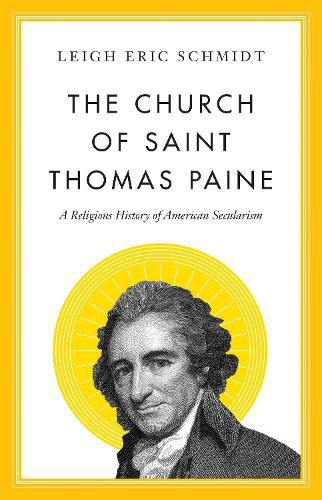Readings Newsletter
Become a Readings Member to make your shopping experience even easier.
Sign in or sign up for free!
You’re not far away from qualifying for FREE standard shipping within Australia
You’ve qualified for FREE standard shipping within Australia
The cart is loading…






The forgotten story of the nineteenth-century freethinkers and twentieth-century humanists who tried to build their own secular religion.
In The Church of Saint Thomas Paine, Leigh Eric Schmidt tells the surprising story of how freethinking liberals in nineteenth-century America promoted a secular religion of humanity centered on the deistic revolutionary Thomas Paine (1737-1809) and how their descendants eventually became embroiled in the culture wars of the late twentieth century.
After Paine’s remains were stolen from his grave in New Rochelle, New York, and shipped to England in 1819, the reverence of his American disciples took a material turn in a long search for his relics. Paine’s birthday was always a red-letter day for these believers in democratic cosmopolitanism and philanthropic benevolence, but they expanded their program to include a broader array of rites and ceremonies, particularly funerals free of Christian supervision. They also worked to establish their own churches and congregations in which to practice their religion of secularism.
All of these activities raised serious questions about the very definition of religion and whether it included nontheistic fellowships and humanistic associations-a dispute that erupted again in the second half of the twentieth century. As right-wing Christians came to see secular humanism as the most dangerous religion imaginable, small communities of religious humanists, the heirs of Paine’s followers, were swept up in new battles about religion’s public contours and secularism’s moral perils.
An engrossing account of an important but little-known chapter in American history, The Church of Saint Thomas Paine reveals why the lines between religion and secularism are often much blurrier than we imagine.
$9.00 standard shipping within Australia
FREE standard shipping within Australia for orders over $100.00
Express & International shipping calculated at checkout
Stock availability can be subject to change without notice. We recommend calling the shop or contacting our online team to check availability of low stock items. Please see our Shopping Online page for more details.
The forgotten story of the nineteenth-century freethinkers and twentieth-century humanists who tried to build their own secular religion.
In The Church of Saint Thomas Paine, Leigh Eric Schmidt tells the surprising story of how freethinking liberals in nineteenth-century America promoted a secular religion of humanity centered on the deistic revolutionary Thomas Paine (1737-1809) and how their descendants eventually became embroiled in the culture wars of the late twentieth century.
After Paine’s remains were stolen from his grave in New Rochelle, New York, and shipped to England in 1819, the reverence of his American disciples took a material turn in a long search for his relics. Paine’s birthday was always a red-letter day for these believers in democratic cosmopolitanism and philanthropic benevolence, but they expanded their program to include a broader array of rites and ceremonies, particularly funerals free of Christian supervision. They also worked to establish their own churches and congregations in which to practice their religion of secularism.
All of these activities raised serious questions about the very definition of religion and whether it included nontheistic fellowships and humanistic associations-a dispute that erupted again in the second half of the twentieth century. As right-wing Christians came to see secular humanism as the most dangerous religion imaginable, small communities of religious humanists, the heirs of Paine’s followers, were swept up in new battles about religion’s public contours and secularism’s moral perils.
An engrossing account of an important but little-known chapter in American history, The Church of Saint Thomas Paine reveals why the lines between religion and secularism are often much blurrier than we imagine.